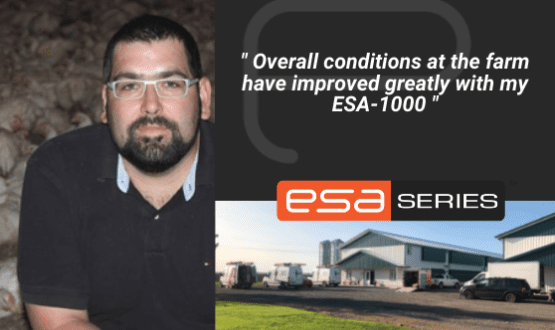Testimonials
What our
customers think
As poultry producers, we understand that managing litter quality is a crucial puzzle piece in the pursuit of peak performance. Wet litter not only hampers growth but can also lead to a host of challenges, from foot lesions to soaring energy costs
David Mercier grows broiler chickens in Saint-Roch-Ouest, 40 minutes out of Montreal. After installing ESA-1000s to reduce his heating costs, he was quickly surprised by the facts that it helped in so many other ways on his farm.
The brothers Randy and Sheldon Martin are both organic broilers producers in Ontario. Their respective farms Whispering Meadows (owned by Randy) and Sheldale Poultry (owned by Sheldon) barns are pretty much identical. The main difference? The first one is equipped with six ESA-1000 heat exchangers while the other one does not have any… for now. For over a year, the brothers have been comparing their respective productions. The results leave no room for doubt.
Many producers were discouraged when propane prices soared in 2019. Exhausted by the frequent increases, the Nova Scotia poultry grower, Tim Cox, decided to take matters in his own hands. He installed ESA-1000 heat exchangers in his barn hoping to lower his heating costs. The results far exceeded his expectations!
When Jean-François Drouin decided to jump in the turkey industry in 2012, he didn't know the ESA-SERIES heat exchangers would be the missing element to meet his quality standards.
Randy Martin is a broiler producer in Owen Sound, Ontario. Concerned about providing a healthy environment for his birds, he found in the ESA-1000 the ideal technology to transform his chicken barn into a haven of peace.
Accompanied by her children and her husband, Isabelle D’auteuil produces 135,000 birds per year. Every winter, the cold weather was a complex puzzle to be managed on their farm in Sainte-Marthe.
Stéphane Forest is a broiler chicken producer located at Sainte-Mélanie, QC. With three chicken barns and 80 000 birds per fleet, his ESA-1000 heat exchangers allow him to reduce his heating costs, improve the birds health and provide a healthy work environment for his son and himself.








